牛津译林版(2019)必修第二册Unit 3 Festivals and Customs Grammar and usage 课件(31张PPT)
文档属性
| 名称 | 牛津译林版(2019)必修第二册Unit 3 Festivals and Customs Grammar and usage 课件(31张PPT) | 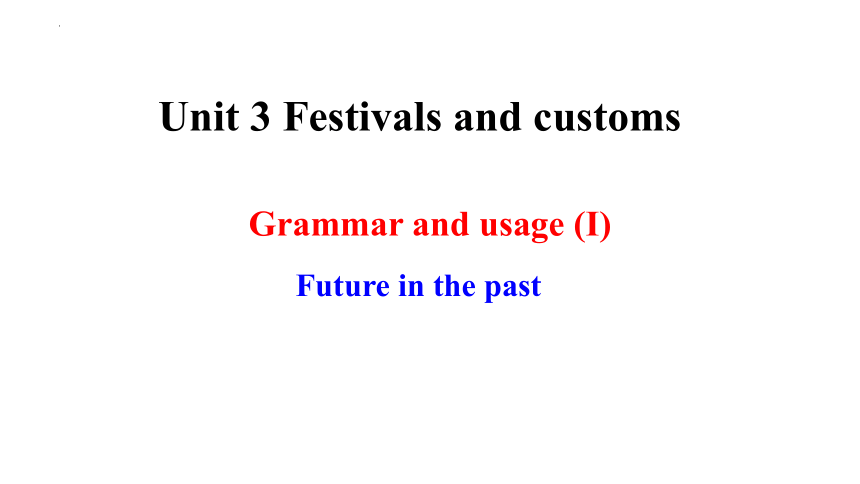 | |
| 格式 | pptx | ||
| 文件大小 | 375.0KB | ||
| 资源类型 | 教案 | ||
| 版本资源 | 牛津译林版(2019) | ||
| 科目 | 英语 | ||
| 更新时间 | 2023-03-09 16:23:22 | ||
图片预览

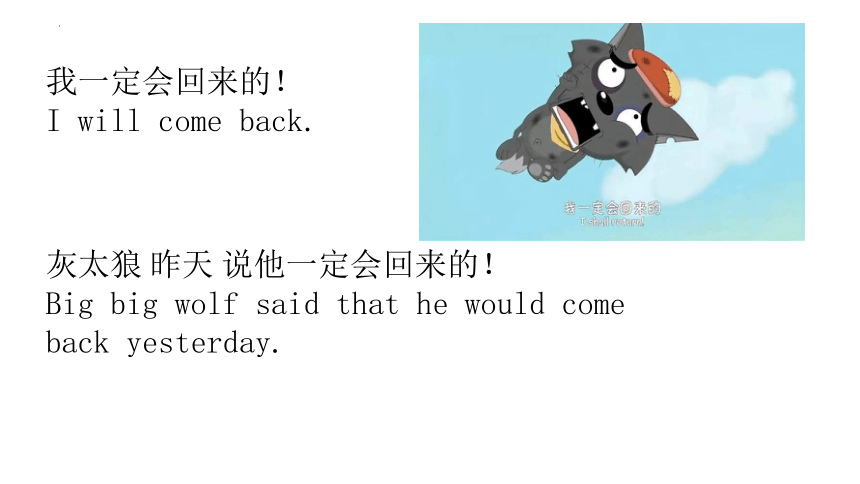
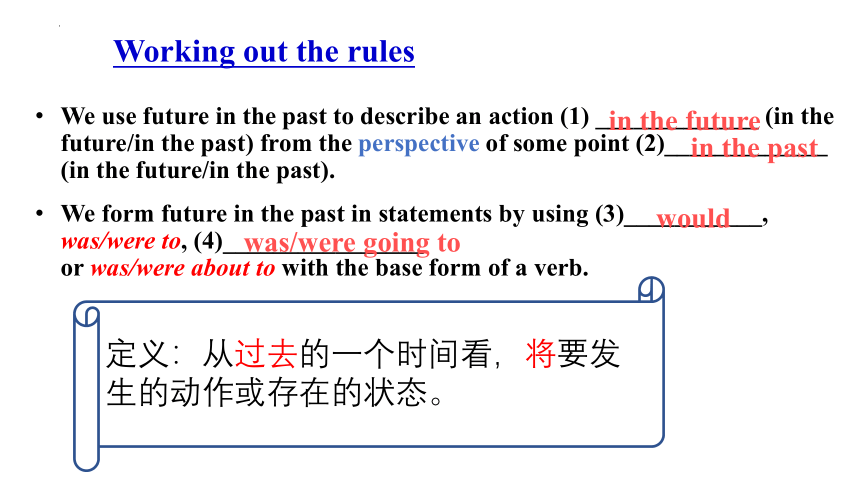
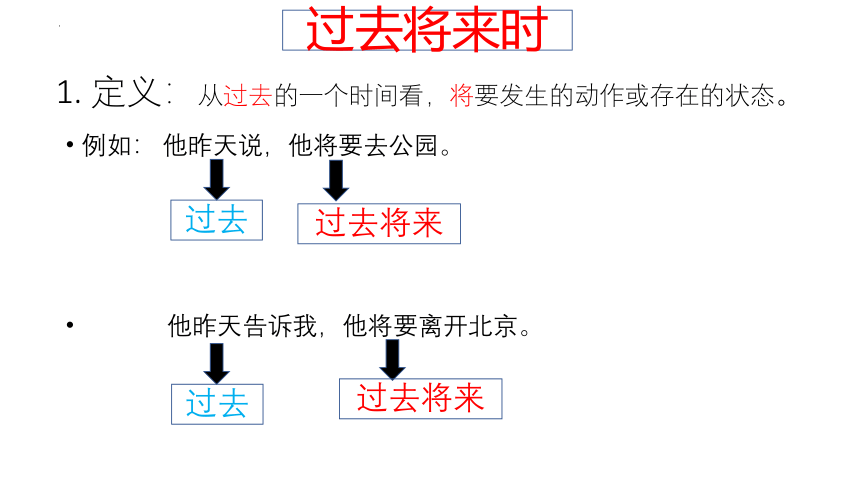
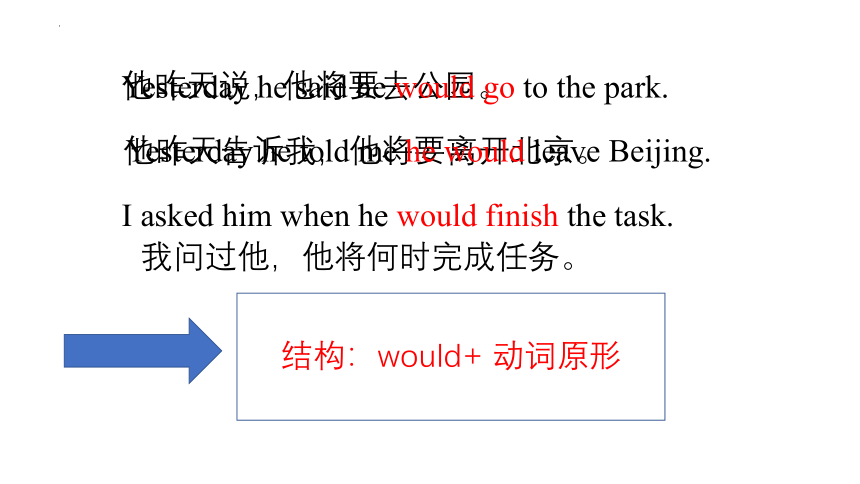
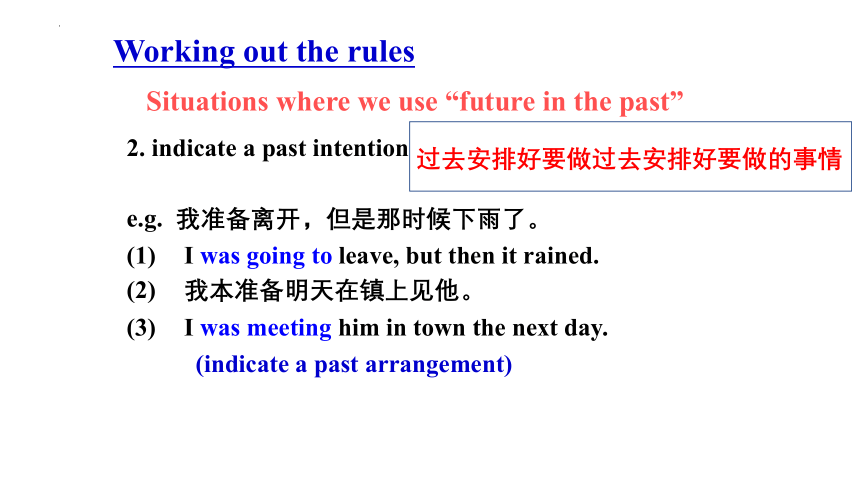
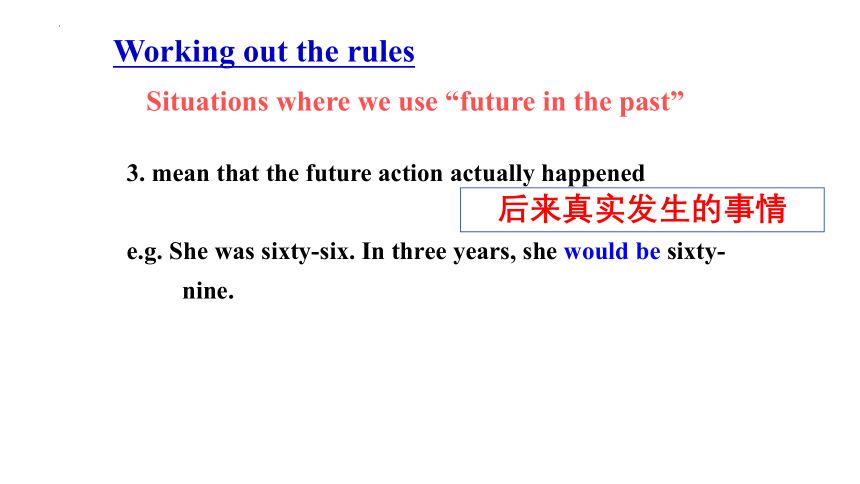
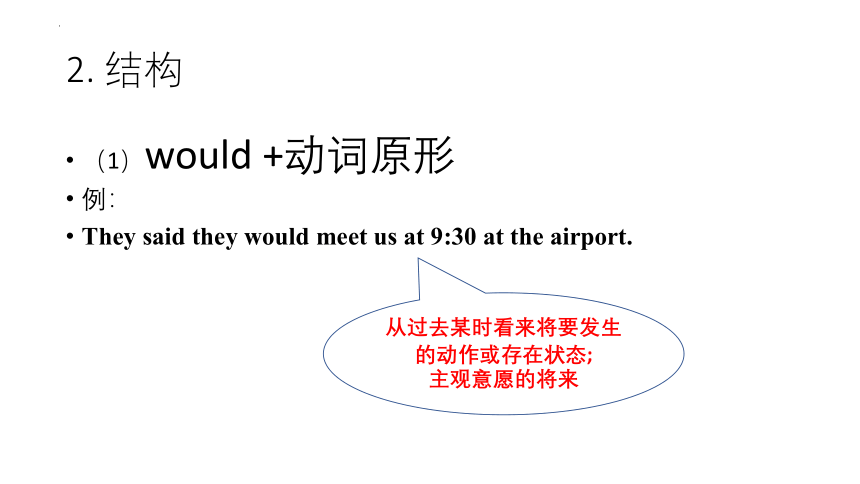
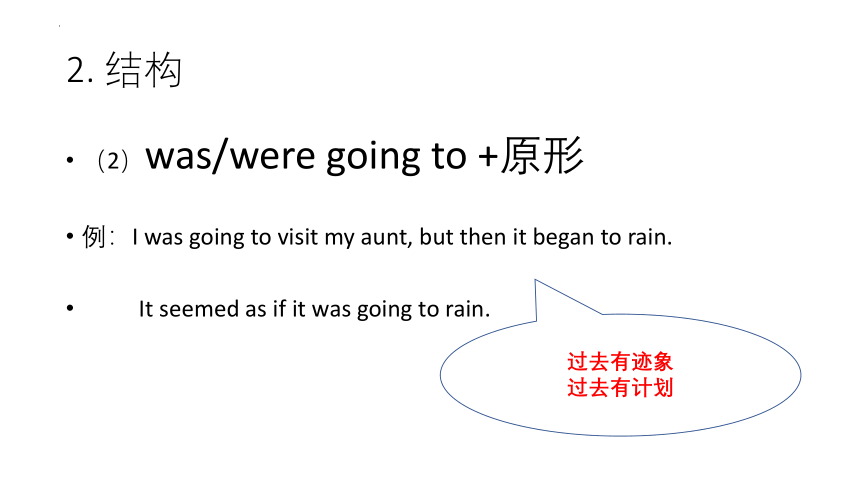
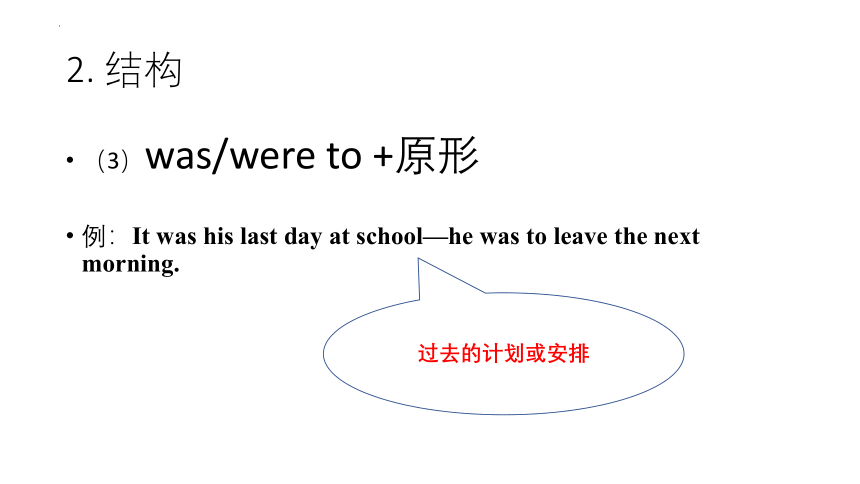
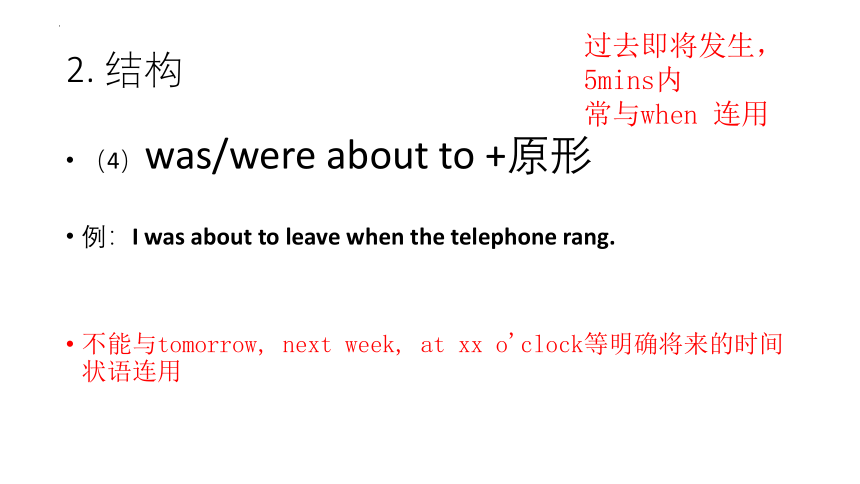
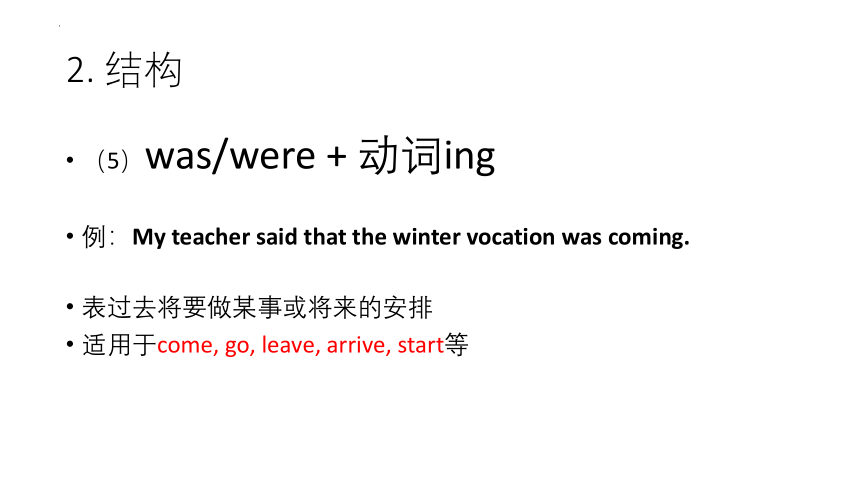
文档简介
(共31张PPT)
Grammar and usage (I)
Future in the past
Unit 3 Festivals and customs
我一定会回来的!
I will come back.
灰太狼 昨天 说他一定会回来的!
Big big wolf said that he would come back yesterday.
Working out the rules
We use future in the past to describe an action (1) _____________ (in the future/in the past) from the perspective of some point (2)_____________ (in the future/in the past).
We form future in the past in statements by using (3)___________, was/were to, (4)________________
or was/were about to with the base form of a verb.
in the future
in the past
would
was/were going to
定义:从过去的一个时间看,将要发生的动作或存在的状态。
1. 定义:从过去的一个时间看,将要发生的动作或存在的状态。
例如: 他昨天说,他将要去公园。
他昨天告诉我,他将要离开北京。
过去
过去将来
过去将来时
过去
过去将来
他昨天说,他将要去公园。
Yesterday he said he would go to the park.
他昨天告诉我,他将要离开北京。
Yesterday he told me he would leave Beijing.
我问过他,他将何时完成任务。
I asked him when he would finish the task.
结构:would+ 动词原形
Working out the rules
2. indicate a past intention
e.g. 我准备离开,但是那时候下雨了。
I was going to leave, but then it rained.
我本准备明天在镇上见他。
I was meeting him in town the next day.
(indicate a past arrangement)
Situations where we use “future in the past”
过去安排好要做过去安排好要做的事情
Working out the rules
3. mean that the future action actually happened
e.g. She was sixty-six. In three years, she would be sixty-nine.
Situations where we use “future in the past”
后来真实发生的事情
2. 结构
(1)would +动词原形
例:
They said they would meet us at 9:30 at the airport.
从过去某时看来将要发生的动作或存在状态;
主观意愿的将来
2. 结构
(2)was/were going to +原形
例:I was going to visit my aunt, but then it began to rain.
It seemed as if it was going to rain.
过去有迹象
过去有计划
2. 结构
(3)was/were to +原形
例:It was his last day at school—he was to leave the next morning.
过去的计划或安排
2. 结构
(4)was/were about to +原形
例:I was about to leave when the telephone rang.
不能与tomorrow, next week, at xx o'clock等明确将来的时间状语连用
过去即将发生,5mins内
常与when 连用
2. 结构
(5)was/were + 动词ing
例:My teacher said that the winter vocation was coming.
表过去将要做某事或将来的安排
适用于come, go, leave, arrive, start等
3. 应用
Yesterday he said he would go to the park.
Yesterday he told me he would leave Beijing.
I asked him when he would finish the task.
例:He said he would live in the country.
他说过,他将要住在乡村。
间接引语
直接宾语
常用于间接引语和宾语从句中
用法1
1. 和表示过去将来时间状语连用,多见于从句,特别是宾语从句中(当主句是过去时,宾语从句表示将要发生的事,用过去将来时)
He said he__________ (return) to the hometown the next day.
We never imagined he_______ (be) a doctor in the future.
A: She washed the car, didn’t she
B: No, she forgot. But she said she____________ (wash) it the next day.
would wash
/was going to wash
would return
would be
用法2
2. 用于转述过去时间,他人所说的话
A: She washed the car, didn’t she
B: No, she forgot. But she said she____________ it the next day.
would wash
/was going to wash
注意:直接引语变成间接引语时,说话的内容的时态以主句为主。
“We’re going to have a test next week.”
The teacher said.
The teacher said that we ______________(have) a test the next week.
“Coke will make a trip to the seaside.”
Coke told us.
Coke told us that he ___________ (make) a trip to the seaside.
were going to have
would make
“A parade will take place in the square soon”.The journalist reported.
The journalist reported that a parade ______________________ (take place) to our city soon.
The boy asked.“Why won’t his friends help him when he is in trouble ”
The boy asked why his friends _______________________ (not help) him when he _______(be) in trouble.
would take place
wouldn’t help
was
“A parade will take place in the square soon”.The journalist reported.
The journalist reported that a parade ______________________ (take place) to our city soon.
The boy asked.“Why won’t his friends help him when he is in trouble ”
The boy asked why his friends _______________________ (not help) him when he _______(be) in trouble.
would take place
wouldn’t help
was
3.过去将来时,用于虚拟语气中
If I were you, I would not do that.
要是我是你的话,我就不会那样做。
If he were here, he would show us how to do it.
如果他在这儿,他就会向我们展示该如何做了。
用法3
3.过去将来时常可用来表示过去习惯性的动作。此时,不管什么人称,一律用would
他一有时间,总是看书。
Whenever he had time,he would do some reading.
当我还是小孩时,我总和他一起玩。
I would play with him when I was a child.
用法3
过去将来时典型错误例析
1. 我们不知道他是否要在会上发言。
误:We didn’t know whether he is going to speak at the meeting.
正:We didn’t know whether he was going to speak at the meeting.
析:该句主句为过去时,且宾语从句表示从过去某个时间看来将要发生的动作,所以从句要用过去将来时态。
2. 老师问汤姆长大后准备干什么。
误:The teacher asked Tom what he was going to be when he would grow up.
正:The teacher asked Tom what he was going to be when he grew up.
析:在时间状语从句中,常用一般过去时表示在过去看来将要发生的动作。
3. 他们说如果下星期天不下雨他们就去农场。
误:They said that they were going to the farm if it would not rain the next Sunday.
正:They said that they were going to the farm if it didn’t rain the next Sunday.
析:在条件状语从句中,也常用一般过去时表示在过去看来将要发生的动作。
4. 王林打电话告诉她妈妈,她要买一些书。
误:Wang Lin rang up to tell her mother that she should buy some books.
正:Wang Lin rang up to tell her mother that she would buy some books.
析:过去将来时可以由“助动词should/would+动词原形”构成,但should一般只用于第一人称。而would可用于各种人称。
第二天晚上8点
10点钟以后
第二天,第二个周五,下一周/月/年
第二天, 接下来的一周/月/年
两天后, 三周后, 四年后
常用时间状语
at eight the next night
the next day/ Friday/ week/ month/ year
the following day/ week /month/ year
two days /three weeks/ four years later
after 10 o'clock
第二天晚上8点
10点钟以后
第二天,第二个周五,下一周/月/年
第二天, 接下来的一周/月/年
两天后, 三周后, 四年后
常用时间状语
at eight the next night
the next day/ Friday/ week/ month/ year
the following day/ week /month/ year
two days /three weeks/ four years later
after 10 o'clock
注意:在表示未来在"某时刻"(不是时间长度)之后,或者"某事件"之后,不能用in,须用after
用所给动词的适当形式填空
1. Miss Zhang said she __________(visit) the Great Wall next summer.
2. She told him that she ___________(not stay) here for long.
3. I wasn’t sure whether Lucy __________ (come) the next year.
4. The scientists said the world’s population ____________ (grow) slowly in future.
would visit
wouldn’t stay
would come
would grow
Jim决定他们下个月坐飞机去英国。
Jim decided_______________________.
她66岁了。三年后,她是69岁。
She was sixty-six. ____________________.
科学家说没有人知道一百年之后将会发生什么事。
Scientists said ___________________.
老师问汤姆长大后准备干什么.
The teacher asked Tom _______________
她告诉我们,如果下雨,她就不和我们一起去了。
She told us _________________________.
Jim决定他们下个月坐飞机去英国。
Jim decided_______________________.
她66岁了。三年后,她是69岁。
She was sixty-six. ____________________.
科学家说没有人知道一百年之后将会发生什么事。
Scientists said ___________________.
老师问汤姆长大后准备干什么.
The teacher asked Tom _______________
她告诉我们,如果下雨,她就不和我们一起去了。
She told us _________________________.
Jim decided they were going to/would fly to Britain the next month.
In three years, she was going to/would be 69 years old.
Scientists said nobody knew what would happen in one hundred years’ time.
The teacher asked what Tom was going to/would do when he grew up.
She told us if it rained, she wouldn’t go with us.
Practice makes perfect
1. Li Ming said he _____________ (be) happy if Brian __________ (come) to China next month.
2. She _________________ (go) to work when the telephone rang.
3. I hoped Tina ______________ (come) to my birthday party on time the next Wednesday.
4. The manager was concerned to hear that two of his trusted workers ______________ (leave).
5. When he ______________ (open) the door, he couldn’t find his keys.
would be
came
was coming
were leaving
was to open
was about to go
Homework
1. Preview the contents on page 35.
2. Finish Exercise C on Page 70.
Grammar and usage (I)
Future in the past
Unit 3 Festivals and customs
我一定会回来的!
I will come back.
灰太狼 昨天 说他一定会回来的!
Big big wolf said that he would come back yesterday.
Working out the rules
We use future in the past to describe an action (1) _____________ (in the future/in the past) from the perspective of some point (2)_____________ (in the future/in the past).
We form future in the past in statements by using (3)___________, was/were to, (4)________________
or was/were about to with the base form of a verb.
in the future
in the past
would
was/were going to
定义:从过去的一个时间看,将要发生的动作或存在的状态。
1. 定义:从过去的一个时间看,将要发生的动作或存在的状态。
例如: 他昨天说,他将要去公园。
他昨天告诉我,他将要离开北京。
过去
过去将来
过去将来时
过去
过去将来
他昨天说,他将要去公园。
Yesterday he said he would go to the park.
他昨天告诉我,他将要离开北京。
Yesterday he told me he would leave Beijing.
我问过他,他将何时完成任务。
I asked him when he would finish the task.
结构:would+ 动词原形
Working out the rules
2. indicate a past intention
e.g. 我准备离开,但是那时候下雨了。
I was going to leave, but then it rained.
我本准备明天在镇上见他。
I was meeting him in town the next day.
(indicate a past arrangement)
Situations where we use “future in the past”
过去安排好要做过去安排好要做的事情
Working out the rules
3. mean that the future action actually happened
e.g. She was sixty-six. In three years, she would be sixty-nine.
Situations where we use “future in the past”
后来真实发生的事情
2. 结构
(1)would +动词原形
例:
They said they would meet us at 9:30 at the airport.
从过去某时看来将要发生的动作或存在状态;
主观意愿的将来
2. 结构
(2)was/were going to +原形
例:I was going to visit my aunt, but then it began to rain.
It seemed as if it was going to rain.
过去有迹象
过去有计划
2. 结构
(3)was/were to +原形
例:It was his last day at school—he was to leave the next morning.
过去的计划或安排
2. 结构
(4)was/were about to +原形
例:I was about to leave when the telephone rang.
不能与tomorrow, next week, at xx o'clock等明确将来的时间状语连用
过去即将发生,5mins内
常与when 连用
2. 结构
(5)was/were + 动词ing
例:My teacher said that the winter vocation was coming.
表过去将要做某事或将来的安排
适用于come, go, leave, arrive, start等
3. 应用
Yesterday he said he would go to the park.
Yesterday he told me he would leave Beijing.
I asked him when he would finish the task.
例:He said he would live in the country.
他说过,他将要住在乡村。
间接引语
直接宾语
常用于间接引语和宾语从句中
用法1
1. 和表示过去将来时间状语连用,多见于从句,特别是宾语从句中(当主句是过去时,宾语从句表示将要发生的事,用过去将来时)
He said he__________ (return) to the hometown the next day.
We never imagined he_______ (be) a doctor in the future.
A: She washed the car, didn’t she
B: No, she forgot. But she said she____________ (wash) it the next day.
would wash
/was going to wash
would return
would be
用法2
2. 用于转述过去时间,他人所说的话
A: She washed the car, didn’t she
B: No, she forgot. But she said she____________ it the next day.
would wash
/was going to wash
注意:直接引语变成间接引语时,说话的内容的时态以主句为主。
“We’re going to have a test next week.”
The teacher said.
The teacher said that we ______________(have) a test the next week.
“Coke will make a trip to the seaside.”
Coke told us.
Coke told us that he ___________ (make) a trip to the seaside.
were going to have
would make
“A parade will take place in the square soon”.The journalist reported.
The journalist reported that a parade ______________________ (take place) to our city soon.
The boy asked.“Why won’t his friends help him when he is in trouble ”
The boy asked why his friends _______________________ (not help) him when he _______(be) in trouble.
would take place
wouldn’t help
was
“A parade will take place in the square soon”.The journalist reported.
The journalist reported that a parade ______________________ (take place) to our city soon.
The boy asked.“Why won’t his friends help him when he is in trouble ”
The boy asked why his friends _______________________ (not help) him when he _______(be) in trouble.
would take place
wouldn’t help
was
3.过去将来时,用于虚拟语气中
If I were you, I would not do that.
要是我是你的话,我就不会那样做。
If he were here, he would show us how to do it.
如果他在这儿,他就会向我们展示该如何做了。
用法3
3.过去将来时常可用来表示过去习惯性的动作。此时,不管什么人称,一律用would
他一有时间,总是看书。
Whenever he had time,he would do some reading.
当我还是小孩时,我总和他一起玩。
I would play with him when I was a child.
用法3
过去将来时典型错误例析
1. 我们不知道他是否要在会上发言。
误:We didn’t know whether he is going to speak at the meeting.
正:We didn’t know whether he was going to speak at the meeting.
析:该句主句为过去时,且宾语从句表示从过去某个时间看来将要发生的动作,所以从句要用过去将来时态。
2. 老师问汤姆长大后准备干什么。
误:The teacher asked Tom what he was going to be when he would grow up.
正:The teacher asked Tom what he was going to be when he grew up.
析:在时间状语从句中,常用一般过去时表示在过去看来将要发生的动作。
3. 他们说如果下星期天不下雨他们就去农场。
误:They said that they were going to the farm if it would not rain the next Sunday.
正:They said that they were going to the farm if it didn’t rain the next Sunday.
析:在条件状语从句中,也常用一般过去时表示在过去看来将要发生的动作。
4. 王林打电话告诉她妈妈,她要买一些书。
误:Wang Lin rang up to tell her mother that she should buy some books.
正:Wang Lin rang up to tell her mother that she would buy some books.
析:过去将来时可以由“助动词should/would+动词原形”构成,但should一般只用于第一人称。而would可用于各种人称。
第二天晚上8点
10点钟以后
第二天,第二个周五,下一周/月/年
第二天, 接下来的一周/月/年
两天后, 三周后, 四年后
常用时间状语
at eight the next night
the next day/ Friday/ week/ month/ year
the following day/ week /month/ year
two days /three weeks/ four years later
after 10 o'clock
第二天晚上8点
10点钟以后
第二天,第二个周五,下一周/月/年
第二天, 接下来的一周/月/年
两天后, 三周后, 四年后
常用时间状语
at eight the next night
the next day/ Friday/ week/ month/ year
the following day/ week /month/ year
two days /three weeks/ four years later
after 10 o'clock
注意:在表示未来在"某时刻"(不是时间长度)之后,或者"某事件"之后,不能用in,须用after
用所给动词的适当形式填空
1. Miss Zhang said she __________(visit) the Great Wall next summer.
2. She told him that she ___________(not stay) here for long.
3. I wasn’t sure whether Lucy __________ (come) the next year.
4. The scientists said the world’s population ____________ (grow) slowly in future.
would visit
wouldn’t stay
would come
would grow
Jim决定他们下个月坐飞机去英国。
Jim decided_______________________.
她66岁了。三年后,她是69岁。
She was sixty-six. ____________________.
科学家说没有人知道一百年之后将会发生什么事。
Scientists said ___________________.
老师问汤姆长大后准备干什么.
The teacher asked Tom _______________
她告诉我们,如果下雨,她就不和我们一起去了。
She told us _________________________.
Jim决定他们下个月坐飞机去英国。
Jim decided_______________________.
她66岁了。三年后,她是69岁。
She was sixty-six. ____________________.
科学家说没有人知道一百年之后将会发生什么事。
Scientists said ___________________.
老师问汤姆长大后准备干什么.
The teacher asked Tom _______________
她告诉我们,如果下雨,她就不和我们一起去了。
She told us _________________________.
Jim decided they were going to/would fly to Britain the next month.
In three years, she was going to/would be 69 years old.
Scientists said nobody knew what would happen in one hundred years’ time.
The teacher asked what Tom was going to/would do when he grew up.
She told us if it rained, she wouldn’t go with us.
Practice makes perfect
1. Li Ming said he _____________ (be) happy if Brian __________ (come) to China next month.
2. She _________________ (go) to work when the telephone rang.
3. I hoped Tina ______________ (come) to my birthday party on time the next Wednesday.
4. The manager was concerned to hear that two of his trusted workers ______________ (leave).
5. When he ______________ (open) the door, he couldn’t find his keys.
would be
came
was coming
were leaving
was to open
was about to go
Homework
1. Preview the contents on page 35.
2. Finish Exercise C on Page 70.
